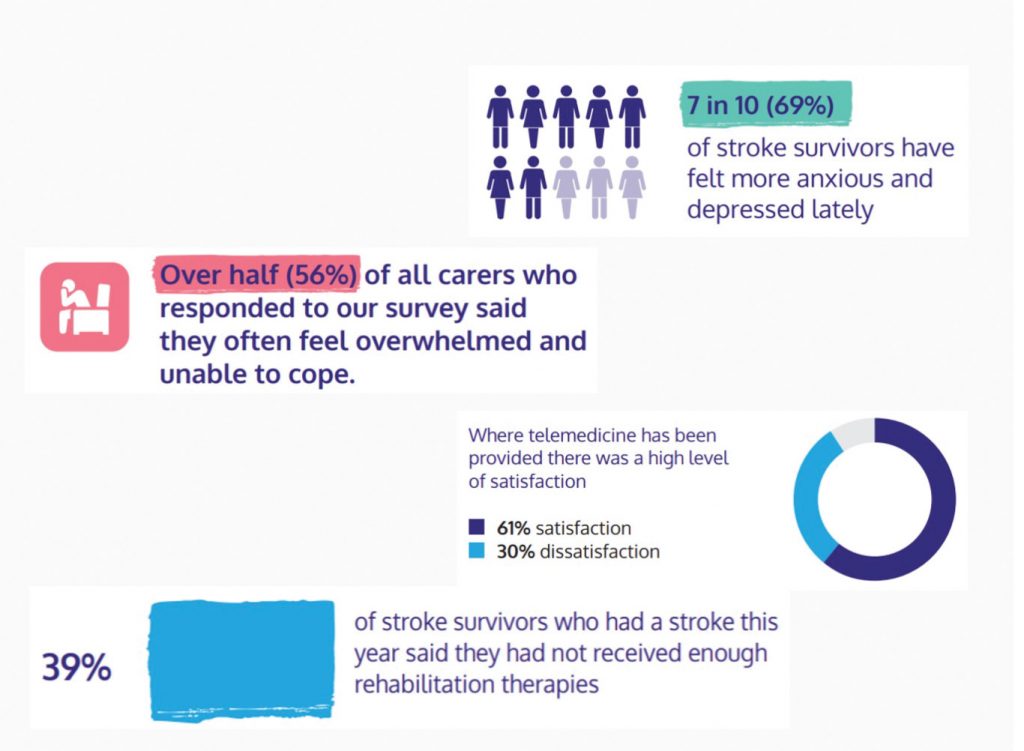The 15th UK Stroke Forum (UKSF) took place virtually for the first time ever, last December (7-9). Around 1800 delegates took part to make this the best attended Forum in its history. The UK Stroke Forum is a coalition of over 30 organisations who are all committed to improving stroke care in the UK and is funded by the Stroke Association and the British Association of Stroke Physicians. Highlights of this years’ programme are outlined below.
Day 1
Juliet Bouverie OBE, CEO of the Stroke Association, opened #UKSF20 and shared some of the biggest innovations in stroke research from the past year. She talked about positive results from a trial of Vagus nerve stimulation for upper limb rehabilitation, the launch of the UK Communication Access Symbol, which was co-ordinated by the Royal College of Speech and Language Therapists and the launch of the Getting It Right First Time National Stroke report.
Delegates saw powerful videos from stroke survivors, clinicians and researchers who shared their experiences of living and working during the COVID-19 pandemic. Juliet highlighted how the Stroke Association has adapted its services to support stroke survivors during the pandemic and the charity’s influencing to ensure that stroke remains a national priority. Dr Deb Lowe, National Clinical Director for Stroke NHSE&I spoke passionately about the new NHS People Plan 2020/21; highlighting that it is more relevant than ever, but “means nothing until we make it so.” The event allowed Deb to reflect on the efforts of health and social care staff and how they’d adapted during the COVID-19 pandemic. Deb expressed that the year had “shone a light on the power of the NHS and its people” and “that we are stronger together than individuals.”
Dr Richard Smith, London School of Hygiene and Tropical Medicine delivered an insightful talk on the role health services play in mitigating the climate crisis, outlining the pathway to a net zero health service. Without a doubt, the pandemic has sparked challenges and opportunities in stroke care. This was discussed during a training session on remote rehabilitation chaired by Dr Lisa Kidd, University of Glasgow and Dr Lesley Scobbie, Glasgow Caledonian University. Speakers Dr Rebecca Fisher, University of Nottingham, Dr Nicola Hancock, University of East Anglia, and Ms Charlie Dorer, Cambridgeshire and Peterborough NHS Foundation Trust covered topics including how stroke survivors can continue to get the support they need and gain access to rapidly developing resources for health and social care professionals.
This was followed by a series of parallel sessions looking at emerging evidence that addresses key questions on COVID-19 and stroke, upper limb function and dysphagia after stroke.
To conclude, delegates were presented with a whistle stop tour of the methods and recommendations in the Getting It Right First Time stroke work stream, to improve the stroke service delivery model at all points in a stroke patient’s care journey.
Day 2
Prof Avril Drummond, University of Nottingham opened Day 2 by highlighting the need for big ambitions in research and clinical practice to help support even more stroke survivors to rebuild their lives. This includes trialling new research methods and uniting the research community to increase funding for stroke research.
Parallel sessions looked at emerging evidence on thrombectomy, poststroke fatigue and telemedicine. There was particular interest in the telemedicine session due to the rapid and significant changes in how rehabilitation has been delivered during the COVID-19 pandemic, with an increase in the use of audio and visual technologies. The general consensus was that these changes can help to reach stroke survivors over a wider geography and more quickly, however these innovations need further evaluation to make sure they are effective and accessible to all stroke survivors. A training workshop brought together diverse perspectives on stroke care at 10 minutes, 10 weeks and 10 years, highlighting that people affected by stroke are not getting the support they need throughout their recovery – which can be a life-long process.
Day 3
On the final day, latest research advances were presented in supported self-management and person-centred long-term care, supporting stroke survivors with aphasia and management of high blood pressure, the biggest risk factor for stroke.
The final session tied together a focus throughout the conference – inequalities in stroke risk, treatment and care – and looked at ways to tackle this.
To conclude, delegates celebrated the achievements of prize winners, including, Prof Marion Walker and Prof John Bamford who were awarded prizes for their contributions to driving improvements in stroke treatment and care.
As this year’s event was virtual, it was easier than ever before to view posters and the exhibition hall. There were also virtual networking rooms and delegates have the opportunity to catch up on all the sessions – which are available online until March 2021. This year’s event highlighted the huge progress that has been made in stroke research and care during a particularly challenging time, and sparked empowered discussions on how to overcome obstacles that remain, so that stroke survivors get the treatment, care and support they need to rebuild their lives.

Look out for registration and more information on UKSF 2021 conference at: www.stroke.org.uk/uksf